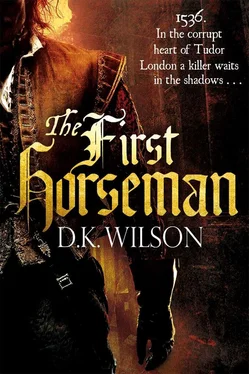D. Wilson - The First Horseman
Здесь есть возможность читать онлайн «D. Wilson - The First Horseman» весь текст электронной книги совершенно бесплатно (целиком полную версию без сокращений). В некоторых случаях можно слушать аудио, скачать через торрент в формате fb2 и присутствует краткое содержание. Год выпуска: 2013, ISBN: 2013, Издательство: Little, Brown Book Group, Жанр: Исторический детектив, на английском языке. Описание произведения, (предисловие) а так же отзывы посетителей доступны на портале библиотеки ЛибКат.
- Название:The First Horseman
- Автор:
- Издательство:Little, Brown Book Group
- Жанр:
- Год:2013
- ISBN:9781405518871
- Рейтинг книги:5 / 5. Голосов: 1
-
Избранное:Добавить в избранное
- Отзывы:
-
Ваша оценка:
- 100
- 1
- 2
- 3
- 4
- 5
The First Horseman: краткое содержание, описание и аннотация
Предлагаем к чтению аннотацию, описание, краткое содержание или предисловие (зависит от того, что написал сам автор книги «The First Horseman»). Если вы не нашли необходимую информацию о книге — напишите в комментариях, мы постараемся отыскать её.
The First Horseman — читать онлайн бесплатно полную книгу (весь текст) целиком
Ниже представлен текст книги, разбитый по страницам. Система сохранения места последней прочитанной страницы, позволяет с удобством читать онлайн бесплатно книгу «The First Horseman», без необходимости каждый раз заново искать на чём Вы остановились. Поставьте закладку, и сможете в любой момент перейти на страницу, на которой закончили чтение.
Интервал:
Закладка:
Shrove Tuesday in 1536 fell on 3rd March. That afternoon I was obliged, with all members of the Company, to attend the Shrove Feast in Goldsmiths’ Hall. After mass in St John Zachary we processed across Maiden Lane into the hall — or, it would be truer to say, we scurried, for it was a day of squally rain and we had to tread quickly but carefully to avoid soiling our shoes and hose with mud or our livery gowns with the water trickling from the roofs. Once inside we were glad of the good fire roaring in the hearth and the light from the candelabra overhead from which smoke spiralled into the dim recesses of the rafters high above us. Ours was not a large building by comparison with those of the other merchant companies and could in no way be compared to the impressive edifice of the Mercers’ new hall, but none could rival us for display. All along high table and the long table that ran the length of the hall, at right angles to it, light glinted on plates, salts, goblets and dishes of gold and silver gilt, while other no less impressive items stood ready for service on the livery cupboards and buffets along the walls.
We were seated in strict order of precedence, which meant that I was closer to the screens passage than the high table where our Prime Warden, Sir William Beaumont, and senior officers sat with the guests of honour.
‘I thought Gardiner was on embassy in France,’ Will Fitzralph, my friend and left-hand neighbour, observed, indicating the man on Sir William’s right, resplendent in a scarlet cope festooned with gilt embroidery.
‘He’s just back for a brief visit, reporting to the king,’ someone further down the table responded. He leaned forward to make himself heard against the clatter of dishes and the buzz of conversation. ‘Those in the know say the good Bishop of Winchester is determined to keep a close eye on the monasteries bill.’
‘What bill is that?’ I asked.
There was a flutter of laughter around me and Will asked, ‘Do you never listen to gossip, Tom, or are you still off on rural rides most days? Everyone’s talking about the king’s plans for the abbeys. They say that it is all the fault of the queen — Henry’s concubine as some call her. She is supposed to be in league with Cromwell to drag us all into Lutheranism.’
The man opposite me, Simon Leyland, was not laughing. ‘That’s just rumour, spread by papists and other troublemakers who do not like the king’s efforts to reform the Church. I trust you’re not among their number, Will.’ Leyland was a choleric man, well known for picking arguments. He glowered across the table, his high colour accentuated by the candles’ glow.
Will stood his ground but replied in a calm, almost casual voice, ‘No empty talk, Brother. I had it from a member of the Commons house.’
Simon glared back belligerently. ‘You don’t want to believe everything politicians tell you, especially those who have fallen for this fashionable heresy they call “New Learning”.’ He wrinkled his nose in a sneer. ‘Do you really think Henry so foolish? People grumble about idle monks and lascivious nuns but if the government tried to turn out all the religious from their convents, folk would soon band together in their defence.’
‘Very likely, Simon.’ Will refused to spoil the festive atmosphere. ‘Anyway, when the bill is debated Gardiner and the other bishops will, doubtless, make sure that it is voted down.’
I turned to glance up at the high table. The Bishop of Winchester (‘Wily Winchester’, as people called him) seemed to be enjoying himself, sharing a joke with the Prime Warden. I had never seen him this close to. What I observed was a man in his fifties with dark eyes that sparkled in a fleshy face. He wore no beard but his upper lip was adorned with what the Italians call a mustaccio . So this was the master of the Southwark Stews; the bishop Lizzie and her associates loved to hate. I ran over in my mind what little I knew about him: career cleric; one of Henry’s new men raised from obscurity to help secure the break with Rome; appointed royal secretary and very close to the king but a jealous guardian of the Church’s privileges, which was why — or so men said — he had been sent on various foreign embassies, as a result of which another upstart, Thomas Cromwell, had taken over as secretary. I looked wistfully along the table at the faces of my brothers. Was it my imagination or were they more grave than they had been in previous years? I had always enjoyed our convivial gatherings but now it seemed we were all looking at each other through a grey haze of politics.
Conversation flagged as we fell to on the first mess set before us by the servants — a course of conies, venison and teal with sundry sauces. While Simon was busy skewering morsels from the dish, I asked Will quietly, ‘What exactly did your Commons friend say?’
He poured the two of us cups of Rhenish. ‘That a bill is being drafted to close down just the smaller monasteries — ones sitting on large endowments but with too few members to keep up the prayers their patrons paid for. There are plans for the money to be used for educational purposes.’
‘That seems reasonable,’ I said.
‘Aye, but many folks are saying that this is but the beginning.’
‘I am reluctant to admit it,’ I muttered, turning my head close to Will’s ear, ‘but I’m inclined to think Brother Leyland is right on that score. All the abbeys to go down? England would be a different country — unrecognisable. The people will never stand for it.’
‘Think you so, Thomas? There were those who said “the people will never stand for it” three years back when the king kicked out the pope and made himself head of the Church — and all for love of a woman.’ Will grinned. ‘And that is enough politics talk for one day.’
The feast extended well into the hours of darkness and all of us were feeling extremely mellow by the time we had disposed of the courses of meat, fish, cheese, elaborate sweetmeats and finally arrived at the voider of apples, nuts and hippocras. Eventually we left the table and, for a while, stood around chatting in groups. It was then that Simon Leyland drew me to one side.
‘How is business, Brother?’ he asked. ‘It is difficult when there is a change at the top. Your father was much respected.’ He crossed himself and wrinkled his brow into a frown of concern.
‘You have benefited from it, I gather. Some of my customers have moved along the Row to your shop.’
He shrugged. ‘We cannot stop men doing business where they will but you must believe me when I say I take no pleasure in seeing your trade decline. I will do anything in my power to help you back on your feet.’ He tried to smile. It seemed to take a prodigious effort.
‘Treviot’s is not on its knees,’ I replied, with an equally insincere grimace.
‘Of course not. Of course not.’ He paused, then lowered his voice — unnecessarily, for there was little chance of his being overheard in the general hubbub. ‘You will, I suppose, be seeking a new wife ’ere long.’
‘I’m in no hurry to forget my late wife,’ I said quietly, struggling to keep my temper.
‘No, indeed, but we all have to look to the next generation.’
‘I have a son and heir.’
‘Indeed, but a viol must have more than one string and life is so very uncertain. Think of the trials of our poor king — nearly thirty years married and only two girls to show for it.’
‘Brother Simon,’ I said, ‘is there a point to this line of talk? There are one or two others I want to catch before they leave.’
‘Just this, Brother. I have a niece — my ward, actually, daughter of my late brother, Edward. She will soon be of child-bearing age and is comely and remarkably accomplished…’
Читать дальшеИнтервал:
Закладка:
Похожие книги на «The First Horseman»
Представляем Вашему вниманию похожие книги на «The First Horseman» списком для выбора. Мы отобрали схожую по названию и смыслу литературу в надежде предоставить читателям больше вариантов отыскать новые, интересные, ещё непрочитанные произведения.
Обсуждение, отзывы о книге «The First Horseman» и просто собственные мнения читателей. Оставьте ваши комментарии, напишите, что Вы думаете о произведении, его смысле или главных героях. Укажите что конкретно понравилось, а что нет, и почему Вы так считаете.












